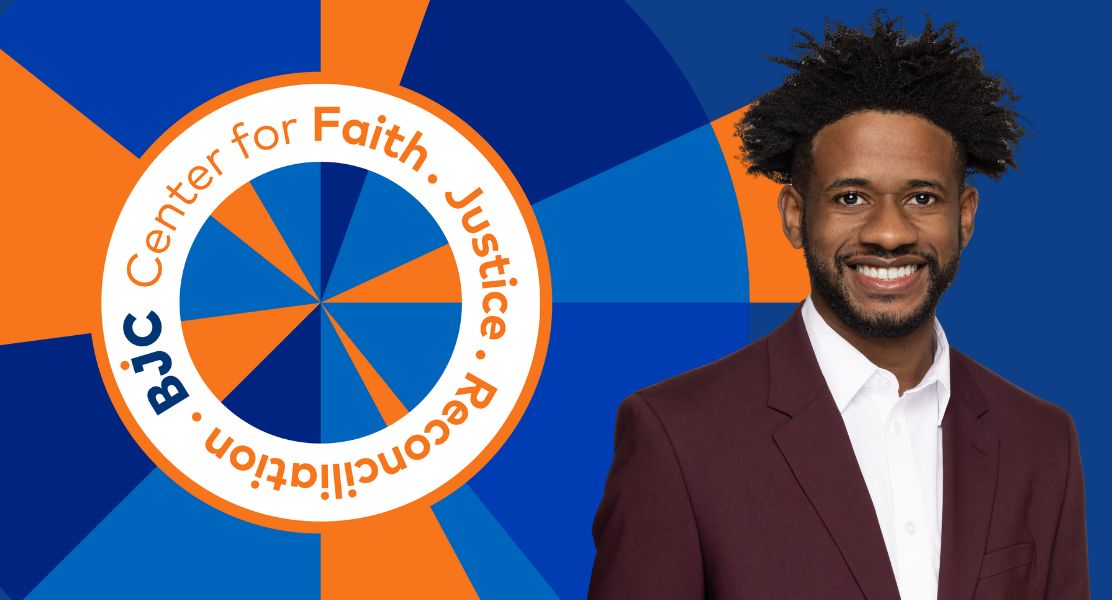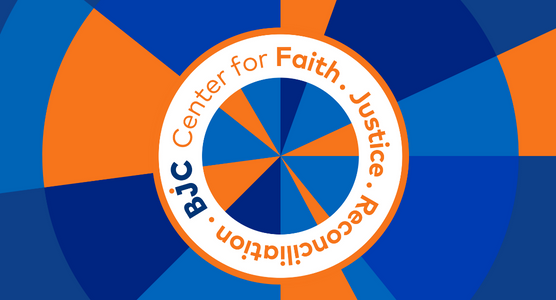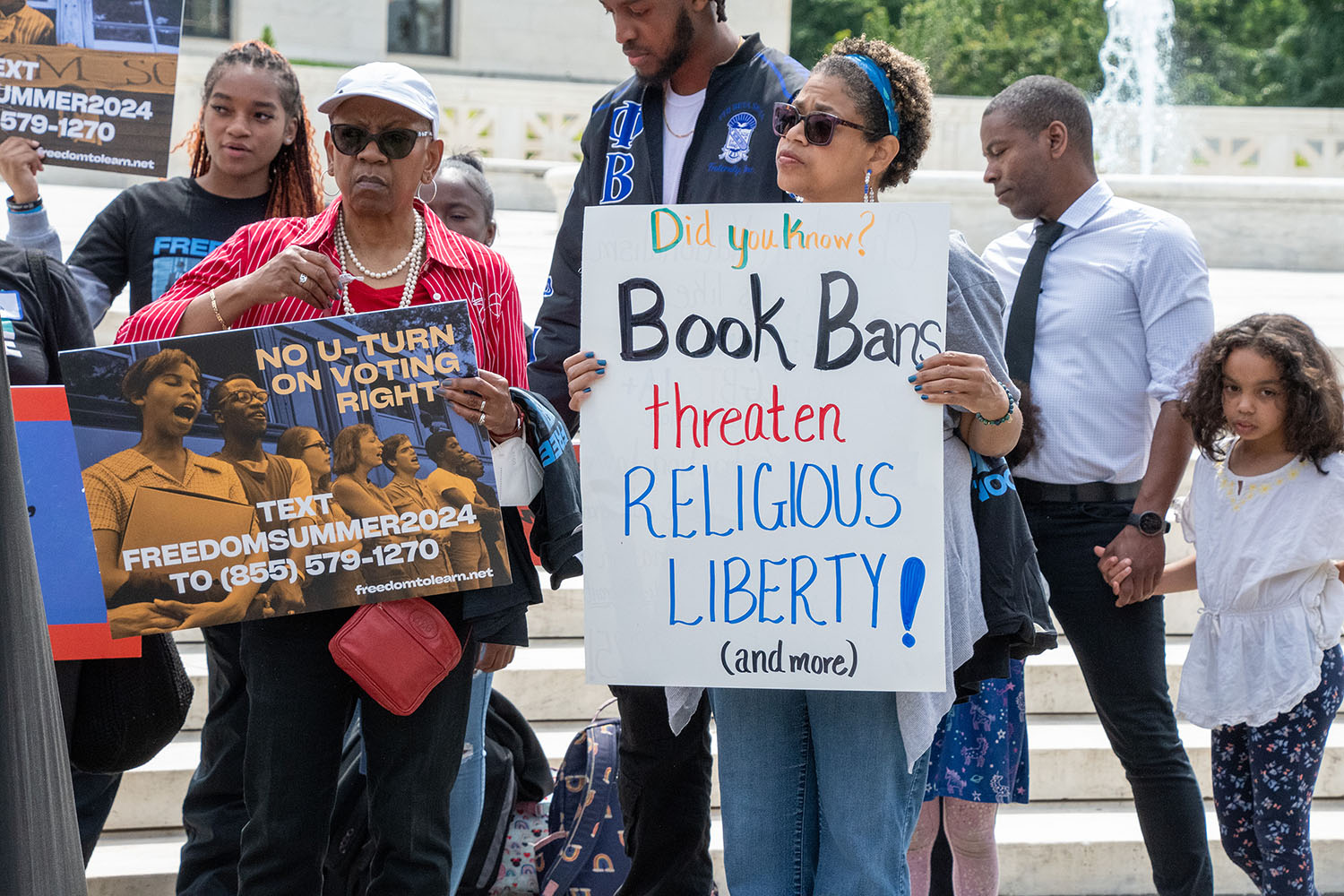Difference does not mean division
Efforts to ban books see differences — such as religious differences — as a threat instead of understanding the benefits of lifting and listening to diverse voices and experiences.

By Jaziah Masters
Research Fellow for the BJC Center for Faith, Justice and Reconciliation
This summer, I found answers to some surprising questions: Who is the only woman whose name appears on the Declaration of Independence? Mary Katharine Goddard, printer to the Continental Congress. Who was the American World War II spy who had a wooden leg? Virginia Hall, who worked for the British Special Operations Executive. What is one rule that evens the playing field at the Paralympics? All runners in the “blind” race wear blindfolds because several different vision levels are classified as “blind.”
These questions represent the breadth of topics I encountered as a summer circulation assistant at the Peabody College Library at Vanderbilt University. Working at a library seems straightforward. People come in, pick out a book or two, and hand their selections to me; I scan the book, and the patron enjoys their new reading material. While that could have the makings of a repetitive summer job, I gained great insight working at the library and seeing the significant role these institutions play in our community.
Libraries are culture centers, inviting us to see the world around us – both in books and in person, across the generations.
The Peabody library hosts an extracurricular summer program, offering local Nashville students the chance to hear from community leaders. Plus, a neighboring early childhood care center visits each month for “story time,” when librarians read some of their favorite books to the kids.It also services Vanderbilt University’s College of Education and Human Development, providing resources on topics including special education, school leadership, education policy, child development, human physiology and educational neuroscience – all at the tip of the fingers.
The children’s section of the library even more clearly illuminates the impact of this place on others. As you turn the corner to enter the children’s section, it can be jarring. You are greeted with the most colorful array of books imaginable. All shapes, sizes, conditions and (unfortunately) misplacements are a staple of this little section of the library. You may even find a puppet or two lying around. What feels chaotic to me brings joy to the children! Here, I saw many children grab a bean bag chair and get lost in a good book. I also saw parents sound out more advanced words as they helped their children read. Every so often, a kid would pick up a bilingual book and try translating it. Our growing dual-language collection offers children’s books in English and Spanish, French, Japanese, Kurdish, Navajo and Chinese (traditional and simplified).
All libraries offer the chance to see our stories and experiences alongside so many others. In my library, you can find books about historical injustice, suffragettes, mindfulness, immigration, same-sex parenting, disability inclusion, math, the AIDS Memorial Quilt, engineering, refugees, and natural disasters. Here, children, youth, seniors and everyone in between have the chance to see themselves represented. It matters. Every one of these topics can be told in a way that is age-appropriate, detailed, well-researched and – above all else – meaningful. Libraries are increasingly offering various online resources, too, including audio books and movie streaming services.
There are religious liberty lessons here. How can we protect faith freedom for all when we do not know or appreciate others’ approaches to faith? Libraries can teach us that appreciation. But an even more important lesson they teach is that difference does not mean division. Differences can – and do – co-exist, even under the same roof! There are even elaborate classification systems in libraries to help visitors not only find exactly what they need but also anything else that might be relevant to the topic they have on their mind.
I am incredibly disheartened to know that so many libraries and librarians are being caught in the crosshairs of efforts to ban books. These malicious attacks often target books about religious, cultural and ethnic minorities for exclusion. Efforts to ban books see differences – such as religious differences – as a threat instead of understanding the benefits of lifting and listening to diverse voices and experiences. Many of these book bans come from those who espouse and adhere to the dangerous ideology of Christian nationalism, which seeks to merge American and Christian identities and tries to find ways to privilege a narrow version of “Christianity” rooted in nativism, white supremacy, authoritarianism, patriarchy and militarism. Christian nationalism demands that identities and experiences outside the mainstream be excluded. The ideology seeks to impose specific tenets of what is acceptable and demonizes anything that challenges its narrow narrative of what it means to be Christian and what it means to be American. Make no mistake: book bans threaten religious freedom, just as Christian nationalism does.
We should all appreciate the important roles libraries serve – in our universities, in our communities and in our families. These are not the places to wage culture wars. Instead, these are places of refuge, exploration, pluralism and possibilities. That is why libraries are such a threat to the exclusionary narratives peddled by Christian nationalism. If there are any battles to be waged, it is in defense of libraries! In our current political climate, we see people attack libraries for making books available that they don’t personally like. These threats are public and personal, sometimes leading to budget cuts or intimidating people who work in the libraries themselves. Often, the books at the center of these “controversies” are by and about historically marginalized communities, addressing topics such as racism, sexuality or gender identity. You can see the seriousness of the problem by looking at the targeting of Pulitzer Prize-winning author Toni Morrison. One of the world’s most celebrated and decorated authors, Morrison was the first Black woman to win the Nobel Prize in Literature. Her writings on the many facets of Black life and Black experiences – addressing some of the darkest moments in American history, such as slavery and its ongoing legacy and trauma – are regularly among the most challenged.
Our elected officials need to hear how much libraries mean to our communities. Most often, that means local civic engagement on our part. It means voting in every local election for people and policies that will defend libraries, even when library funding is not directly on the ballot. It means going to city council or school board meetings (or possibly another local institution in charge of government funding) and sharing your support of libraries.
If you haven’t been to your local library in a while, I encourage you to visit! Say hello and share an encouraging word with the staff there. Get a library card or renew yours. Check out a diverse range of books. Most libraries have a local Friends of the Library group, and you can donate to their programs. Be sure to attend events at your library, too.
Why do libraries matter? I found the answer to that in every book I touched, every person who came through the door, and every librarian I talked with this summer. In a world where we see concentrated efforts to promote narrow views of society and citizenship and exclude differing experiences, our libraries continue to serve as a place where all of us can come together. They remind us that there is room for all our stories, and they leave open the possibility of new ones.
Jaziah Masters is the research fellow for the BJC Center for Faith, Justice and Reconciliation.
This article originally appeared in the fall 2024 edition of Report from the Capital. You can view it as a PDF or read a digital flip-through edition.
Responding to book bans
Here are some ways to support the freedom of information provided by books and our libraries.
Civic engagement
Know the positions of your school board and town council members. Testify on the importance of book freedom at local meetings.
Library support
Give your money and your time to your library, providing a steadfast presence.
Sharing books
Read and engage in dialogue about banned books, and work to dispel myths and rumors.






